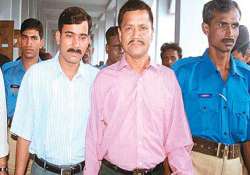ULFA leader Chetia wants to return to India
Dhaka, Jun 21 : Separatist ULFA leader Anup Chetia, imprisoned in Bangladesh, has sought his repatriation to India along with two other detained members of the outfit, officials said today.“Mr Chetia has expressed his willingness

Dhaka, Jun 21 : Separatist ULFA leader Anup Chetia, imprisoned in Bangladesh, has sought his repatriation to India along with two other detained members of the outfit, officials said today.
“Mr Chetia has expressed his willingness to return to India and we have forwarded his petition to our home ministry for consideration,” Tawhidul Islam, senior superintendent of northwestern Rajshahi Central Jail, told PTI.
Islam said Chetia, who had earlier sought political asylum in Bangladesh, also wanted repatriation of two other fellow detained ULFA leaders—Laxmiprasad Goswami and Babul Sharma—who are lodged in separate prisons in Bangladesh. Prison officials said Chetia, who is in mid-40s, has been kept at a “division ward” meant for socially privileged inmates under jail code.
Bangladesh police arrested Chetia in 1997 and was subsequently handed down seven years of jail term by a court for cross-border intrusion, carrying fake passports and illegally keeping foreign currencies.
Despite the end of his term, ULFA general secretary Chetia is in jail under a 2003 High Court directive to keep him in safe custody until the government makes a decision on his petition seeking political asylum in Bangladesh, officials earlier had said.
Chetia's repatriation plea came as media reports said most of the ULFA leaders preferred negotiation with Indian authorities.
Bangladesh in January this year signed an extradition treaty with India mutually agreeing to deport wanted “criminals” lodged in each prisons.
Under the agreement, only persons with charges like murders, culpable homicide and other serious offenses would come under the purview of the deal while offenders of small crimes awarded with imprisonment for less than one year will not be covered under the treaty.
Bangladesh's home minister Mahiuddin Khan Alamgir at that time, however, said Chetia's issue was pending for a judicial decision as he sought Supreme Court's intervention after Dhaka rejected his petition seeking asylum in Bangladesh after his 1997 arrest.
“Mr Chetia has expressed his willingness to return to India and we have forwarded his petition to our home ministry for consideration,” Tawhidul Islam, senior superintendent of northwestern Rajshahi Central Jail, told PTI.
Islam said Chetia, who had earlier sought political asylum in Bangladesh, also wanted repatriation of two other fellow detained ULFA leaders—Laxmiprasad Goswami and Babul Sharma—who are lodged in separate prisons in Bangladesh. Prison officials said Chetia, who is in mid-40s, has been kept at a “division ward” meant for socially privileged inmates under jail code.
Bangladesh police arrested Chetia in 1997 and was subsequently handed down seven years of jail term by a court for cross-border intrusion, carrying fake passports and illegally keeping foreign currencies.
Despite the end of his term, ULFA general secretary Chetia is in jail under a 2003 High Court directive to keep him in safe custody until the government makes a decision on his petition seeking political asylum in Bangladesh, officials earlier had said.
Chetia's repatriation plea came as media reports said most of the ULFA leaders preferred negotiation with Indian authorities.
Bangladesh in January this year signed an extradition treaty with India mutually agreeing to deport wanted “criminals” lodged in each prisons.
Under the agreement, only persons with charges like murders, culpable homicide and other serious offenses would come under the purview of the deal while offenders of small crimes awarded with imprisonment for less than one year will not be covered under the treaty.
Bangladesh's home minister Mahiuddin Khan Alamgir at that time, however, said Chetia's issue was pending for a judicial decision as he sought Supreme Court's intervention after Dhaka rejected his petition seeking asylum in Bangladesh after his 1997 arrest.